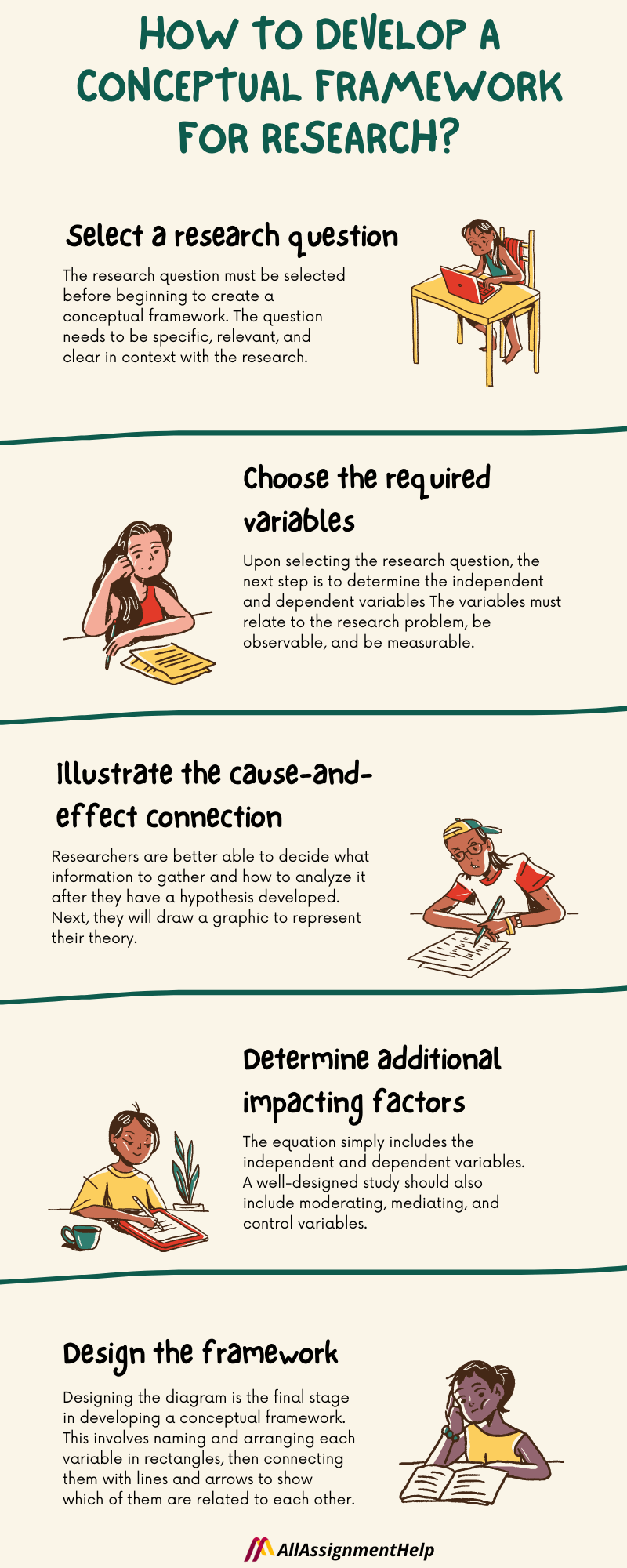Table of Contents
Research is a methodical process of analysis that includes information gathering and analysis to find solutions to problems. It is vital to conduct research in several sectors, including the social sciences, business, education, and healthcare. One way to do in-depth research is a conceptual framework. A conceptual framework is a crucial component of research that guides the research and helps in the organization and interpretation of the data gathered. An effective conceptual framework is the foundation of quality research. In this blog of All Assignment Help, we will make you familiar with everything that you must know about this type of framework. Here, we will discuss about conceptual framework definition, the importance of conceptual framework, conceptual framework for research. Let’s get started!
What Is Conceptual Framework?
A conceptual framework comprises the primary concepts, factors, connections, and presumptions that guide the research study. It creates the theoretical framework and offers an opening through which data can be interpreted and analyzed by researchers. It offers a foundation for understanding the study problem by referencing pre-existing ideas, models, or bodies of knowledge. Furthermore, it also sets research questions, determines relevant variables, and defines the parameters of the research.
Additionally, it also guides the selection of suitable procedures and data analysis approaches. A researcher gathers information using scientific and non-scientific research methods. Academics and researchers often utilize this to organize and summarize their opinions.
Read Here: Basic Things You Should Know About Qualitative Research Methods
The Different Parts of a Conceptual Framework
Conceptual frameworks include different primary parts. These include the following:
| Variables | These are components that could change or fluctuate as the research progresses. |
| Constructs | They are hypothetical. concepts used in research but not observable through physical means. These are usually based on one or more variables. |
| Hypotheses or Research Questions | These influence how variables and constructs relate to one another in a study. |
| Theoretical Framework | This refers to models and concepts that provide the Conceptual Framework with explanation or support. |
Importance of Conceptual Framework
The following highlights the importance of a conceptual framework for research projects that all students need to be aware of before beginning:
Create a Foundation for Research Design
The framework serves as a guide for the research analysis, highlighting the main concepts, elements, connections, and interdependent factors. As a result, it supports in creation of rational, targeted, and organized studies.
Clarify Research Goals and Objectives
It facilitates the formulation of a precise research objective. Research initiatives often become less focused and unclear. It reduces their usefulness. On the other hand, a well-crafted conceptual framework helps in researchers’ ability to stay focused. It strengthens the scope of the research project, assisting in keeping it on course and delivering significant outcomes.
Give the Study a Theoretical Foundation
Understanding the important factors and how they relate to one another is necessary to form a hypothesis. Researchers must first determine these factors to develop a conceptual framework. This makes sure that before deciding on the study design researchers have a firm grasp of the topic. Also, it assists them in choosing the best research and analytical techniques.
Ensure Validity and Reliability
A strong framework helps in ensuring the reliability and accuracy of the study. It ensures that the research measures the things it is supposed to assess and that the results hold up over time. This framework also helps while creating an argumentative research paper or project.
A conceptual framework is your most potent toolkit if you are leading the charge in your research.
How to Develop a Conceptual Framework for Research?
Developing a conceptual framework can be a simple and successful procedure if you follow a few steps. These include the following:

Select a research question
The research question must be selected before beginning to create a conceptual framework. The question needs to be specific, relevant, and clear in context with the research. Its formulation must be predicated on an analysis of the body of current research as well as the identification of knowledge gaps and areas in need of additional study. There are reliable research paper help services available to assist you in selecting the best research question.
Choose the required variables
Upon selecting the research question, the next step is to determine the independent and dependent variables. The variable that is measured or observed in research is called the dependent variable. Whereas, the variable that is altered or controlled is called the independent variable. Usually, the cause is the independent variable and the result is the dependent variable. The variables must relate to the research problem, be observable, and be measurable.
Illustrate the cause-and-effect connection
Here’s where researchers start to formulate their theories. Their intuition and subject-matter expertise will allow them to forecast how the independent variable will affect the dependent variable. Researchers are better able to decide what information to gather and how to analyze it after they have a hypothesis developed. Next, they will draw a graphic to represent their theory.
Determine additional impacting factors
The equation simply includes the independent and dependent variables. A well-designed study should also include moderating, mediating, and control variables. These factors need to be taken into consideration as they may affect how the two primary variables relate to one another. A moderating variable can modify the relationship between the independent and dependent variables. A mediating variable clarifies how the two are related.
Design the framework
Designing the diagram is the final stage in developing a conceptual framework. This involves naming and arranging each variable in rectangles, then connecting them with lines and arrows to show which of them are related to each other. You are free to include as many illustrations of relationships as you choose as long as the relationships directly support the points you are trying to make.
Your framework may appear different from others depending on its scope and the number of concepts you want to include in it. This is because different topics may express themselves in different ways.
Examples of a Conceptual Framework
Example 1: Sir Isaac Newton is credited with creating the most popular conceptual framework. He developed concepts and hypotheses on motion and gravitation by observing his surroundings. Later on, he gained a reputation for his contributions and for conceptualizing several theories and areas of inquiry. In addition, he suggested many experiments to generate different types of hypotheses for the analysis and validation of conceptual research.
Example 2: Consider the following scenario: you are researching the effect of worker motivation on company output. You can identify and visualize the relationships between these two variables by developing a Conceptual Framework. It will serve as the foundation for your research.
Example 3: Suppose you were to conduct qualitative research on the organizational culture of a tech startup. The ideas and concepts covered by the conceptual framework might include team dynamics, shared values, leadership style, and communication patterns. An all-encompassing understanding of the research problem is shaped by these interconnected and connected parts to the broader organizational culture.
Also Read: Guidelines to Conduct Effective Academic Research Using the Internet
Final Thoughts!
A conceptual framework is an essential component of research. It directs the research process and offers a theoretical foundation for the topic. It also offers a foundation from which to draw conclusions and suggestions in considering the information gathered.
Don’t hesitate to contact us at any time of day if you need help creating a conceptual framework. We do all possible to give students theoretical insights into research methods as well as contextual clarity. Our team of experts is familiar with conceptual frameworks and how to go into detail about both theoretical and conceptual frameworks. They can also help you in creating such a framework for your online classes. You can get online class help from us to get a well-developed conceptual framework.
FAQs
| What are the important components of a conceptual framework? These important components of a conceptual framework are experience, theory, literature, and previous knowledge. |
| What format does a conceptual framework follow? The conceptual framework can be made as a flowchart, mind map, concept map, or process diagram to represent the hypothesis and the chain of variables. |
| What types of conceptual frameworks are there? A conceptual framework may be narrative or graphical, highlighting the main concepts or variables and their current relationship. |
